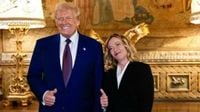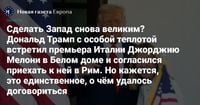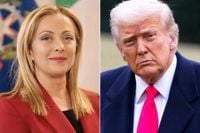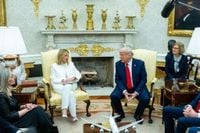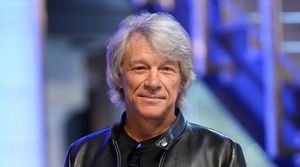On April 17, 2025, U.S. President Donald Trump met with Italian Prime Minister Giorgia Meloni at the White House, marking a significant moment in transatlantic relations. Meloni became the first European leader to visit Washington after Trump suspended tariffs on imports from over 75 countries, including member states of the European Union. During their meeting, the two leaders exchanged mutual compliments and discussed various pressing issues, including immigration, trade, and the ongoing war in Ukraine.
Trump emphasized the need for a "reasonable" approach to immigration in Europe, stating, "I am not a big fan of what Europe has done in the field of immigration," and adding that the steps taken have caused serious damage to Europe. He praised Meloni's tough stance on immigration, reflecting a shared concern over the challenges posed by migrant flows.
Meloni, for her part, expressed optimism about changing European immigration policies. She noted that the focus of debates has shifted from merely distributing migrants to preventing illegal border crossings and returning those who arrive. The Italian Prime Minister highlighted the importance of bilateral cooperation, revealing that Italian companies plan to invest around $10 billion in the United States in the near future.
During the press conference, Meloni announced a new slogan: "Make the West great again," which she shared on her X account. She described her vision of the West not just as a geographical area but as a civilization that needs to be strengthened. Meloni called for collaboration to overcome existing disagreements between the U.S. and Europe.
In addition to immigration and trade, the two leaders discussed defense, energy, and space cooperation. Meloni expressed Italy's desire to expand supplies of liquefied natural gas from the U.S., and both leaders reaffirmed their commitment to NATO. They emphasized the importance of ensuring that trade between the U.S. and Europe is "mutually beneficial, fair, and reciprocal."
The meeting also touched on the war in Ukraine, with Trump stating that he expects a response from Moscow regarding a ceasefire proposal. He remarked, "We are close to the end of the war," and expressed skepticism about Ukrainian President Volodymyr Zelensky's handling of the situation. Meloni, however, reiterated her belief that Russia and Putin are responsible for the invasion.
Despite the friendly atmosphere, tensions arose when the issue of Ukraine was raised. Trump criticized Zelensky, stating he is "not a big fan" of the Ukrainian president, which prompted Meloni to navigate the delicate topic carefully. She reassured Trump that they share similar political views, emphasizing the need for unity in addressing global challenges.
Following the meeting, Meloni thanked Trump on her X account, stating, "Cooperation between Italy and the U.S. is based on shared values and long-standing friendship. We will continue working together to strengthen ties and effectively counter global challenges." This sentiment was echoed in a joint statement released after the meeting, which confirmed the leaders' commitment to developing mutual relations in security, economics, and technology.
Both leaders recognized the necessity of creating a non-discriminatory environment for digital services to encourage investment from advanced technology companies. They also discussed potential collaboration in space technologies, including upcoming missions to Mars and lunar exploration as part of the Artemis program.
As the meeting concluded, Trump accepted Meloni's invitation to visit Italy, possibly during an upcoming EU summit. The Italian Prime Minister expressed hope that this visit would further strengthen dialogue between the U.S. and Europe.
In the wake of the meeting, reactions from the European Union were mixed. While some officials expressed concern over Meloni's close ties to Trump, others recognized her as a potential mediator between the U.S. and Europe amidst rising transatlantic tensions. The EU hopes Meloni can persuade Trump to avoid imposing additional tariffs and to adopt a more diplomatic approach to the ongoing conflict in Ukraine.
Meloni's approach to her relationship with Trump has been characterized by a willingness to engage with him on his terms. This strategy may position Italy as a crucial ally for the U.S. in Europe, especially if Meloni continues to lead. As one observer noted, "Italy could become the best ally of the U.S. if Meloni remains Prime Minister."
The meeting between Trump and Meloni demonstrates a significant moment in the evolving landscape of international relations, where the dynamics between the U.S., Italy, and the broader European context are increasingly intertwined. As both leaders aim to bolster their respective positions, the outcomes of their discussions will likely reverberate across the Atlantic for years to come.
